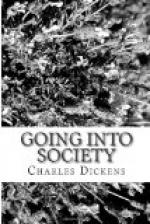One sing’ler idea he had in that Ed of his, which must have meant something, or it wouldn’t have been there. It was always his opinion that he was entitled to property. He never would put his name to anything. He had been taught to write, by the young man without arms, who got his living with his toes (quite a writing master he was, and taught scores in the line), but Chops would have starved to death, afore he’d have gained a bit of bread by putting his hand to a paper. This is the more curious to bear in mind, because he had no property, nor hope of property, except his house and a sarser. When I say his house, I mean the box, painted and got up outside like a reg’lar six-roomer, that he used to creep into, with a diamond ring (or quite as good to look at) on his forefinger, and ring a little bell out of what the Public believed to be the Drawing-room winder. And when I say a sarser, I mean a Chaney sarser in which he made a collection for himself at the end of every Entertainment. His cue for that, he took from me: “Ladies and gentlemen, the little man will now walk three times round the Cairawan, and retire behind the curtain.” When he said anything important, in private life, he mostly wound it up with this form of words, and they was generally the last thing he said to me at night afore he went to bed.
He had what I consider a fine mind—a poetic mind. His ideas respectin his property never come upon him so strong as when he sat upon a barrel-organ and had the handle turned. Arter the wibration had run through him a little time, he would screech out, “Toby, I feel my property coming—grind away! I’m counting my guineas by thousands, Toby—grind away! Toby, I shall be a man of fortun! I feel the Mint a jingling in me, Toby, and I’m swelling out into the Bank of England!” Such is the influence of music on a poetic mind. Not that he was partial to any other music but a barrel-organ; on the contrary, hated it.
He had a kind of a everlasting grudge agin the Public: which is a thing you may notice in many phenomenons that get their living out of it. What riled him most in the nater of his occupation was, that it kep him out of Society. He was continiwally saying, “Toby, my ambition is, to go into Society. The curse of my position towards the Public is, that it keeps me hout of Society. This don’t signify to a low beast of a Indian; he an’t formed for Society. This don’t signify to a Spotted Baby; he an’t formed for Society.—I am.”
Nobody never could make out what Chops done with his money. He had a good salary, down on the drum every Saturday as the day came round, besides having the run of his teeth—and he was a Woodpecker to eat—but all Dwarfs are. The sarser was a little income, bringing him in so many halfpence that he’d carry ’em for a week together, tied up in a pocket-handkercher. And yet he never had money. And it couldn’t be the Fat Lady from Norfolk, as was once supposed; because it stands to reason that when you have a animosity towards a Indian, which makes you grind your teeth at him to his face, and which can hardly hold you from Goosing him audible when he’s going through his War-Dance—it stands to reason you wouldn’t under them circumstances deprive yourself, to support that Indian in the lap of luxury.




